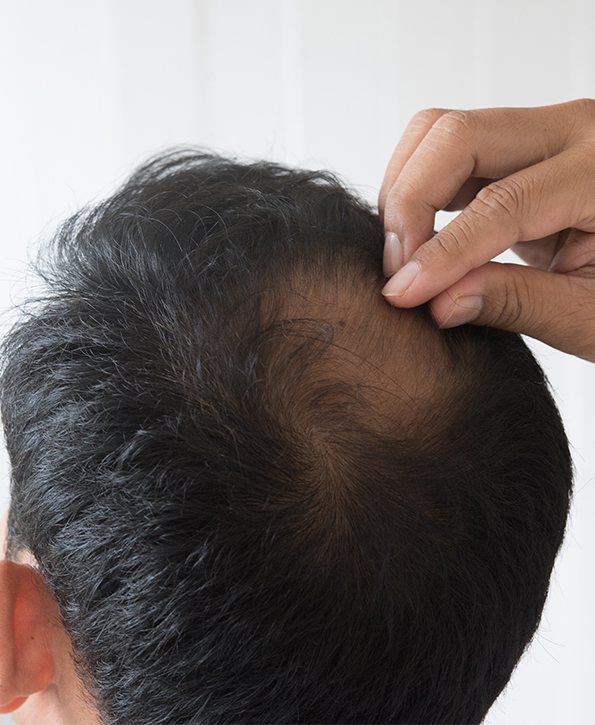WHAT WE TREAT
DISCOVER
SHOP ALL
Hair Loss

What is Hair Loss?
Scientifically known as alopecia, hair loss is a condition where the shedding or thinning of hair is noticeable. It is quite common and affects both men and women causing a loss of confidence and distress.
Understanding the Hair Growth Cycle
The origin of hair takes place from roots or follicles located beneath the skin’s surface. The blood vessels present at their base provide essential nourishment to these follicles for proper hair growth. Anagen, Catagen, Telogen, and Exogen are different stages each strand of hair surpasses.
Symptoms of Hair Loss
Hair part widening, receding hairline or the hairline moving backwards, circular or patchy bald spots, sudden extreme hair fall, and redness and itching in the scalp due to the presence of flakes, or painful bumps on the scalp
Causes of Hair Loss
Thyroid, pregnancy, childbirth, menopause, hereditary hair loss, accidents, childbirth, recovery from illness, emotional distress or stress, improper diet, smoking, drinking, and lack of sleep, and certain treatments for arthritis, acne, gout, depression or blood pressure
How Common is it?
62%
of Indians experience some degree of hair loss by the age of 35
59%
of Indian men over 50 are affected with male pattern baldness
15%
of Indian women over 42 go through extensive hair fall
94%
of India go through hair loss caused by androgenetic alopecia
Want to find out more? We worked with our doctors to create this Ultimate Guide to ED
Your personalized Treatment

Our Medical Board
Case Studies
FAQ

How do I know what kind of hair loss I am suffering from?
In the case of men encountering a receding hairline or progressive hair loss as they age, the underlying condition is often attributed to male pattern baldness. Male pattern baldness is a form of permanent hair loss that regrettably lacks a definitive cure. Nonetheless, numerous treatments are available that can help impede the progression of hair loss and even stimulate hair regrowth. However, it is highly advisable for men who experience abrupt hair loss without any discernible cause or pattern to promptly seek medical attention. These instances of sudden hair loss may be indicative of an underlying medical condition such as alopecia areata, vitamin deficiency, or the adverse effects of medication. Encouragingly, these types of hair loss are typically transient and tend to resolve once the underlying medical condition is effectively addressed.
Can everybody grow their hair back?
Unfortunately, not every individual possesses the ability to facilitate the regrowth of their hair, as a multitude of factors can contribute to the phenomenon of hair loss. Consequently, it is crucial to acknowledge that treatments such as Minoxidil and Finasteride may not manifest as efficacious remedies in every conceivable scenario. This firmly underscores the paramount importance of engaging in meaningful and enlightening discussions with medical practitioners, who possess the necessary expertise and knowledge to guide individuals through their unique circumstances.
Do nutritional deficiencies contribute to hair loss?
Indubitably, insufficiencies in key nutrients like iron, zinc, or biotin can indeed play a role in the occurrence of hair loss. It is imperative to comprehend that maintaining a well-rounded diet replete with vital nutrients holds significant sway over fostering robust hair growth and overall hair health.
I have patchy hair loss. Is it actually possible to reverse it?
The prospect of hair regrowth is contingent upon the root cause of hair loss. Certain forms of hair loss, such as pattern baldness, may not be entirely reversible; nevertheless, a plethora of treatments and interventions exist that can decelerate the rate of hair loss and foster the stimulation of new hair growth.
Hair Loss: Causes, Symptoms, and Treatment
What is Hair Loss?
It is not unhealthy to lose hair. People casually lose almost 100 hair follicles every day. It is usual to lose some hair as a part of your hair growth cycle, old hair is shed off and new germinates in replacement. However, it is notable that hair strands that shed should be less than or equal to the hair that is growing. For those whose hair shed more than their growth is known as hair loss. In other words, it is also known as alopecia. Hair loss patterns may vary between genders and age groups. Hair loss can take place on the scalp and other body parts.Types of Hair Fall
Hair fall is not only of one type, it comprises several subdivisions depending upon the root cause of the problem. The most common four subdivisions include:Androgenic Alopecia:
Some complications are inherited and androgenic alopecia is one of rhythm. It is baldness that occurs as it carries in the bloodline and can transfer from father to son. It doesn't just affect hair and scalp but also affects body hair.Alopecia Areata:
Alopecia areata is a complication in which hair loss occurs due to autoimmunity. It means that body cells do not recognise their own cells and kill them causing hair cell death and hair loss. It is most commonly seen in patients undergoing cancer treatment. Medications and other Alopecia areata treatments can aid in reducing hair fall, but they will not completely let the disease go away.Anagen Effluvium:
Anagen effluvium more commonly known as chemotherapy-induced hair loss. Anagen is a phase of the hair cell cycle in which the hair is in its anagen phase. The hair loss occurs due to the presence of toxins such as alkylating agents used widely for chemotherapy. The hair strand breaks from the strand.Telogen Effluvium:
Telogen is a phase in the cell cycle. In this type of hair fall, rapid shredding occurs in a short duration. It usually occurs when the human body is under stress. The stress can be of any type, physical or chemical. Other than that such type of hair loss also occurs due to hormonal fluctuations inside the body. Hormonal changes can occur due to puberty, menopause or any other hormone-related disorder.How Common is Hair Loss?
Hair loss and hair fall problems are very common in India. Almost 62 per cent of people in India start experiencing hair loss as they grow old and after reaching the age of 35. Moreover, male pattern baldness and female pattern baldness are so common that as much as 94 per cent of people facing hair loss suffer from androgenic alopecia. Almost 59 per cent of Indian men above the age of 50 are affected with androgen alopecia which is much more than almost half of the population of males. Environment contributes majorly in causing hair loss and another reason is stress due to the complications that we face in our social lives.Causes of Hair Loss
Hair loss is the most common problem faced by many people nowadays due to the changing environment, increasing population in metro cities, increased stress due to work and education, social conflicts, and bad lifestyles. However, there are other reasons for hair loss:- Inherited: Inherited baldness usually runs in the bloodline and transfers from parents to their offspring. Baldness can also be genetic and its hair loss treatment is usually very complex.
- Fungal infection: Healthy hair comprises hair that is free from any pathogen, thick and rich in lustre. Fungs can invade hair and can cause serious infections and hair fall.
- Dandruff and Lice: Life are small bug-like creatures that suck blood from the scalp for survival, whereas dandruff is the peeling of the upper layer of the scalp. Both of them indicate unhealthy hair and can cause hair fall.
- Tight hairstyle and hair tie: Sometimes people tie their hair very tightly and keep it tied for a very long time. This causes external stress and the hair is stretched from the roots causing expulsion of hair from its root.
- Hair hair loss treatments: Various hair treatments available in the market are responsible for hair loss. Many times bleaches and dyes used for hair make them fragile and easy to break.
- Hormonal fluctuations: Hormonal fluctuations can cause massive hair fall. Females suffering from PCOD and PCOS experience this the most. Additionally, metabolic diseases like the thyroid can also cause hair to fall from its roots.
- Malnutrition: Malnutrition is majorly not enough nutrition reaching the hair from your diet. Diet not only influences your overall body functioning but it also affects scalp and hair strength. A diet with not enough iron and protein can cause hair loss because hair is made up of protein.
- Stress: Stressful events can potentially lead to hair loss. Hey majorly include undergoing surgery, chemotherapy, radiotherapy or consuming medications that cause hair loss as its side effect. Additionally, emotional stress due to separation or any other reason can also cause hair loss.
Symptoms and Complications Associated with Hair Loss
There are several signs and symptoms that indicate hair loss. However, the signs and symptoms may depend on person to person and are not common for everyone. One basic way to spot hair loss is by observing frequent hair fall. You usually spot your hair all over the floor, washing sink, clothes and everywhere you imagine. There are other symptoms that you can look for:- Male pattern baldness is indicated by the receding hairline and is an easy spot.
- Visible small patches on the scalp.
- Hair thinning and weak hair that breaks easily, is majorly seen in females.
- Loss of hair visible on the body and scalp.
Hair Loss Diagnosis
The diagnosis of hair loss involves a physical diagnosis where you can simply pull your hair and check if strands come out or not. Sometimes the hair loss cannot be prevented and is obvious, majorly in cases with chemotherapy. In some cases, your physician can check by using other ways such as:- Check the family history and the bloodline if the patient is already having a problem in his/her genes. Sometimes the hair loss problem is transferred from parents and hair is shed off even after extreme care.
- You should also check your medications and medical history of diseases. There can be diseases and medications that are associated with hair loss.
- Conducting a blood test to check if the person is suffering from hormonal or metabolic disorders such as PCOD or thyroid. Also, there can be chances that the person may suffer from skin cancers.
- You should get the samples of your hair checked for susceptible diseases.
- One can also undergo a scalp biopsy to check for possible signs of complications such as skin cancers or infections.
- Some tests can identify the strength and possibly of your hair loss. One such test is the hair tensile strength and hair pull test. These simple tests can tell your physician if you’re suffering from any possible problem or not.
Hair Loss Treatment
If the cause behind your hair fall is medications or hormonal disturbances then your doctor can prescribe you medications to manage your disease which will also treat the problem. Most of the hair loss treatments are made to treat male pattern baldness and female pattern baldness. Some of the hair treatment methods include: Medicaments: One can look for medications that are causing hair loss and look for replacements whose side effects do not cause hair loss (in possible cases). There are some readily available medications available in the market that stimulate hair growth and prevent thinning of hair. A person can also consider taking supplements for hair loss that contain essential nutrients and vitamins. Hair Transplant: A hair transplant is a hair fall treatment for people who are not able to get back hair after taking medical therapies. It involves a method in which the service provider surgically places every single strand of hair on your scalp. The physician usually takes hair from your body where there is abundance and places it in the area where the hair is thin. PRP Therapy: PRP therapy refers to platelet-rich plasma therapy. Your physical will elucidate some of your blood fluid from your body and will separate the plasma component of it. They then place the needle over your scalp and inject plasma into the area where there is a loss of hair. This hair loss treatment has been shown to reduce hair loss from the scalp and promote hair growth.Prevention of Hair Loss
The preventive measures for hair loss can be taken to prevent hair loss and distress that comes due to hair loss. Some of the major precautionary measures that one can take include:- Promoting a good and healthy nutrient and vitamin-rich diet that encourages hair growth.
- Managing stress, which can be physical or mental.
- Management of hormonal and metabolic diseases and seeking complete alopecia treatment for them.
- Avoid hairstyles that require excessive pulling of hair.
- Covering your hair when you go out.
- Applying essential oils and using good shampoos to avoid hair fall due to external environments and chemicals.
2023 nirvasa.com








